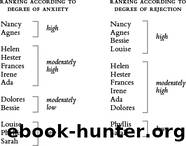The meaning of anxiety by Rollo May

Author:Rollo May
Language: eng
Format: mobi
Publisher: W. W. Norton & Company
Published: 2019-08-28T02:10:42.143755+00:00
Thus love, for example, instead of being a constructive means of overcoming individual isolation, is often a means of self- aggrandizement. One uses love for competitive purposes in the rivalry over winning a socially desirable and enviable mate; it is a proof of one’s social competence; the mate is viewed as an acquisition in much the same way as one would view winning profits on the stock market. Another common example is valuing one’s children because they win prizes in college or in other ways add to the competitive status of the family name. In our culture love is frequently sought as a means of allaying anxiety, but when it occurs in a competitive, depersonalized framework, it increases feelings of isolation and hostility and thereby increases anxiety.
Anxiety arises as a result of the individualistic competitive pattern here discussed not simply when the individual finds his possibilities for success threatened but in many more subtle ways. Anxiety arises out of the interpersonal isolation and alienation from others that inheres in a pattern in which self-validation depends on triumphing over others. This anxiety was already discernible in many of the powerful and successful individuals of the Renaissance (we noted it in Michelangelo). Anxiety likewise arises out of the intrasocial hostility produced by competitive individualism. Finally, anxiety arises out of the self-alienation resulting from viewing one’s self as an object of the market, or making one’s feeling of self-strength dependent on extrinsic wealth rather than intrinsic capacity and productivity. We are a “community . . . who has to obey his buyer,” in Auden’s terms. These attitudes not only distort one’s relation to one’s self, but to the extent that they make one’s criterion of self-worth contingent upon a kind of success which can be threatened every day by one’s neighbors’ counter-success, they augment one’s feeling of vulnerability, helplessness, and powerlessness.
Moreover, “vicious circle” mechanisms operate in the individualistic competitive pattern which tend to make anxiety self-increasing. The culturally accepted method of allaying anxiety is redoubling one’s efforts to achieve success. Since intrasocial hostility and aggression can be expressed in the socially approved method of competition, the anxious individual increases his competitive striving. But the more competitive, aggressive striving, the more isolation, hostility, and anxiety. This vicious circle may be graphed as follows: competitive individual striving→ intrasocial hostility→ isolation→ anxiety→ increased competitive striving. Thus the methods most generally used to dispel anxiety in such a constellation actually increase anxiety in the long run.
We now turn to the problem of the relation between the quantity of anxiety experienced by contemporaneous individuals and the present state of our culture. The conviction that Western civilization in the twentieth century is permeated by considerable quantities of anxiety (or anxiety-like states) has been expressed in different ways by Tawney, Tillich, Mumford, Fromm, Horney, Mannheim, Cassirer, Riezler, and others. Each presents the evidence and the explanation for the situation from the particular viewpoint of his or her own explorations. The common agreement is that underlying this anxiety are profound cultural
Download
This site does not store any files on its server. We only index and link to content provided by other sites. Please contact the content providers to delete copyright contents if any and email us, we'll remove relevant links or contents immediately.
Should I Stay or Should I Go? by Ramani Durvasula(6785)
Why We Sleep: Unlocking the Power of Sleep and Dreams by Matthew Walker(5642)
Fear by Osho(4085)
Flow by Mihaly Csikszentmihalyi(4052)
Rising Strong by Brene Brown(3780)
Why We Sleep by Matthew Walker(3772)
Too Much and Not the Mood by Durga Chew-Bose(3694)
How to Change Your Mind by Michael Pollan(3678)
The Hacking of the American Mind by Robert H. Lustig(3580)
Lost Connections by Johann Hari(3455)
He's Just Not That Into You by Greg Behrendt & Liz Tuccillo(3302)
Evolve Your Brain by Joe Dispenza(3051)
What If This Were Enough? by Heather Havrilesky(2945)
Resisting Happiness by Matthew Kelly(2887)
Crazy Is My Superpower by A.J. Mendez Brooks(2860)
The Courage to Be Disliked by Ichiro Kishimi & Fumitake Koga(2797)
The Book of Human Emotions by Tiffany Watt Smith(2770)
Descartes' Error by Antonio Damasio(2731)
In Cold Blood by Truman Capote(2685)
